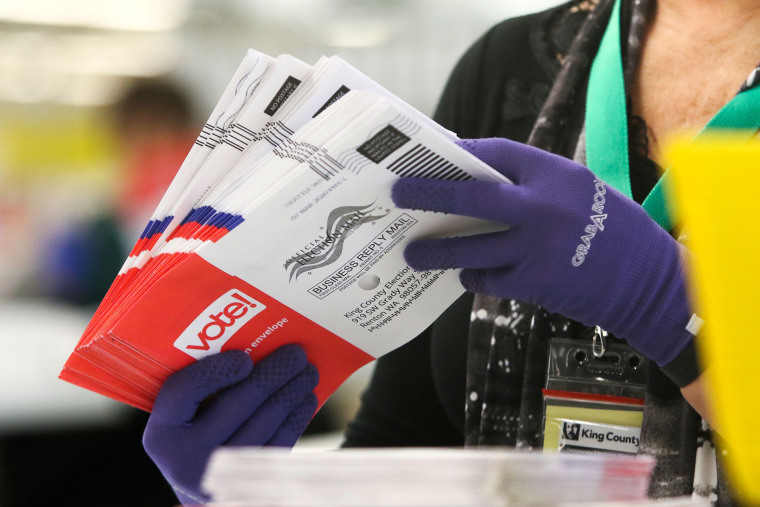As the coronavirus leaves voters fearing polling places, states that don’t already allow everyone to mail their ballot are trying to figure out how to do so.
Federal law requires that states provide some sort of means for members of the military and citizens abroad to cast their votes. While a majority of states also offer “no excuse” absentee ballots, meaning anyone can request one, more than a dozen do not.
In most cases, the state’s chief election official doesn’t have the power to single-handedly implement voting by mail, and even if they could, that means a new host of logistical hurdles.
“We're looking at all of our options right now,” one Texas state official, who was not authorized to comment on the matter publicly, said on the condition of anonymity. “We don't know what exactly we're going to end up doing. There's the legal end of it, which you've got the governor's disaster declaration that helps, and we've got to figure out where that ends and a court order begins.”
“The realistic problem is infrastructure,” the official said. “The counties just aren't set for big volumes of voting by mail.”
Illinois, a state that does allow no-excuse absentee ballots, held its primary Tuesday despite President Donald Trump saying the day before that people should avoid gatherings of more than 10 people. It faced logistical challenges from the virus and saw severely reduced turnout early in the day. Voting by mail was one of the few parts of the process that went smoothly.
“I’d say vote-by-mail protected us from losing probably 150,000 votes,” Matt Dietrich, a spokesperson for the state’s board of elections, said. “We found it invaluable.”
West Virginia, which is not a no-excuse state, gained the blessing from the state’s attorney general to engineer a legal workaround for its May 12 primary: any voter can vote by mail by claiming fear of the coronavirus as an excuse.
“I can’t change the law,” Warner said in a press conference Wednesday. “I can make interpretations.”
In Connecticut, it’s more difficult. State law offers absentee ballots to voters who are concerned about “his or her illness.” Connecticut Secretary of State Denise Merrill has called on Gov. Ned Lamont to issue an emergency executive order to remove that language, effectively offering mail-in ballots statewide.
“In order to ensure that Connecticut voters are able to cast a ballot on April 28th, absentee ballots must be available for voters who want to follow public health advice and avoid polling places,” Merrill said in a statement.
One possibility is a federal bill to provide voting by mail nationwide, including emergency funds, proposed by Sen. Ron Wyden, D-Ore.
“States are increasingly realizing that unless they give voters the chance to cast ballots by mail, they may not be able to hold elections,” he said.
Missouri would need the legislature to enable statewide voting by mail, said Secretary of State Jay Ashcroft, but he isn’t convinced implementing such a system is the right choice.
“As an election authority, my first thought is ‘no’ on any new election [methods], because I'm worried about the unintended consequences,” Ashcroft said. “Anytime we change something, that creates the ability for a hiccup later on because people aren't used to it.”
Ashcroft said that there are alternatives to vote by mail.
“I think my job, and other election officials in the government, is to be that firm, noble, unmoving, bedrock in turbulent times,” he said. “If need be, we can have the National Guard there, to set up polling places or to act as poll workers or to help keep people in small groups so we're doing the right social distancing.”
